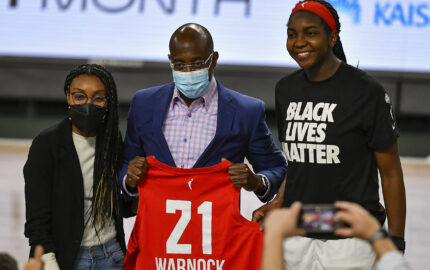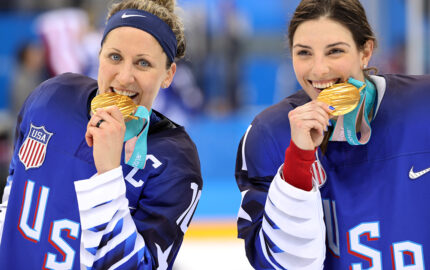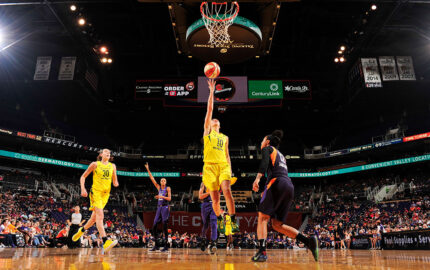Sue Bird, 38, is one of the greatest basketball players of all-time. Period.
After winning two NCAA championships at UConn, Bird was the first overall pick in the 2002 WNBA draft. She has spent her entire WNBA career with the Seattle Storm, collecting three WNBA titles and making a league record 11 All-Star teams. And Bird plans to be back for the 2019 season. She has also played point guard on four gold medal-winning Olympic teams and competed in Russia.
Related Reading
“7 Ways to Improve Coverage of Women’s Sports”
by Shira Springer
Throughout her career, she’s experienced the growth of the WNBA and watched coverage of women’s sports evolve. She’s seen fan and media interest rise, fall, and plateau. Bird knows exactly how cyclical interest in her sport is, increasing during the Final Four, the WNBA Finals, and the Olympics, then fading away in most markets during most other times of the year. She hopes for more consistent coverage in the future.
Here are edited excerpts from Shira Springer’s conversation with Bird about coverage of women’s basketball:
Getting fans engaged
The Seattle Times does give us a lot of love. They probably give us the most love of anybody in Seattle, to be honest. Every now and then some TV stations do as well. But where’s the constant coverage? It shouldn’t just be, ‘Oh, hey, look they actually are pretty good. They’re in the Finals. You guys should check it out.’ There are story lines that get missed without constant coverage throughout the season. So, while I’m thankful, I’m also frustrated that it’s not like that all the time because that’s why people might tune into a Mariner’s season. They’re seeing it in the newspaper. Maybe they’re following somebody’s hit streak or there are other story lines that get people connected to teams and then they go, regardless win or lose. We want to have those fans that are with us all the time, not just when we win.
The “cool” factor and its link to attendance
UConn women’s basketball has developed their own little cool factor. And with that, it becomes an event. You can go to an NBA game and there’s a percentage of people who are there just because it’s a cool event to go to. They might not even like basketball that much. The Seattle Sounders is a soccer team that gets 30,000-plus fans a game. Clearly what they did was they sold a culture. You put the scarf on, you tailgate, you hang out with your friends, and you’re part of this larger group and it’s got a cool factor about it.
On Olympics coverage
When you have USA on your jersey, you are now representing something different than just a women’s sports team. I think there’s a cool factor. And, of course, it’s the 12 best players in the country so it’s essentially an all-star team. But truth be told, I think the media could do better. We’ve won six gold medals in a row and it’s not really talked about—the dominance of it. It’s kind of like, ‘Oh, yeah, they dominate. Boring.’ It should be applauded.
The importance of backstories and story lines
When you know the backstories of players, of teams, of leagues and those stories are told, people are more likely to latch on. I just don’t know that our stories are told. I think our lives are these big mysteries and you can see it in all the misconceptions that are out there about who we are, what we do, what we ask for, what we don’t ask for, how much money we make, how much money we don’t make, everything across the board. And I just think if people did know more, they would be more likely to tune in, would be more likely to become fans.
I’m waiting for the day when I turn on [ESPN morning programs] “Get Up” or “First Take” and they’re actually talking about [women’s] story lines. You know, like ‘Last night in the NBA, I saw on Twitter, it looked like Draymond Green was talking to Anthony Davis trying to recruit him. That becomes a story line. We don’t have those.
We’re never a talking point. They might show our highlights and every now and then when we complain about money and the collective bargaining agreement comes up, yeah, they might talk about that. Or, if a player says something outrageous on Twitter, they love picking that up. But never are the actual day-to-day stories told. But that’s what grabs people.
On the impact of social media
I didn’t grow up with a cell phone. It took me a while to get onboard and, even now, I’m probably not as active [online] as I should be. But I do see how there are certain players that can really push a conversation and really get messages out there. The way they do it via social media has definitely been beneficial.
The tough side of coverage
I give men’s sports and male athletes a lot of credit because what comes with coverage is critique. They get critiqued and judged more than anybody. From a female athlete standpoint, if we do get the coverage, that’s probably going to come along with it. That part looks tough. They get critiqued for the amount of money they make. They can’t ever complain. They get critiqued if they miss a shot. You don’t have that kind of critique unless you have a journalist following you. It’s what drives, at times, conversations with fans. It’s what they debate over at the bar, right? Who’s better Michael Jordan or LeBron James?
On what’s next
I don’t know that I have the exact answers for you on what to do. It’s tough. I think if we all knew what to do next, the WBA would be a billion-dollar business by now. But you have to figure it out. That’s what this is about, right? So the good news is we’re all talking about it and trying to figure it out.



